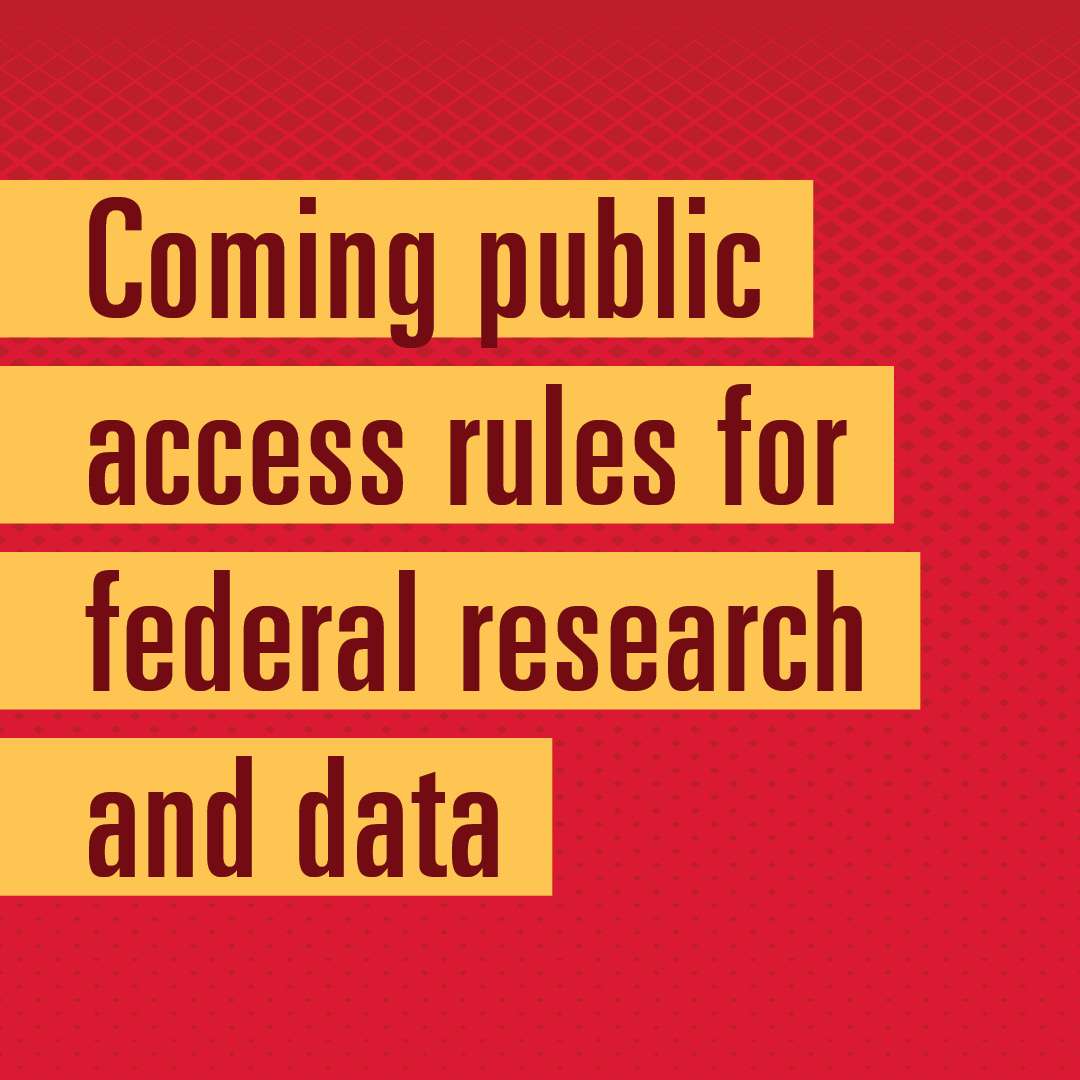
Starting in January 2026, authors with federally sponsored projects will need to publicly share their research publications and supporting data immediately and without embargo. Authors must deposit the accepted manuscript version of an article in a repository managed by the agency or their institution. Alternatively, authors may deposit the version of record if the article is published Open Access.
These requirements come from a 2022 memorandum from the White House Office of Science and Technology Policy: Ensuring Free, Immediate, and Equitable Access to Federally Funded Research. The memorandum directs all federal agencies that provide funding to researchers to develop guidelines for how the outputs from funded projects will be publicly shared.
While agencies have until December 31, 2025, to finalize their guidelines, some agencies—such as the National Science Foundation— may enact many of their new requirements earlier than this date. Science.gov maintains an updated list of public sharing plans and timelines for many federal agencies.
All funding agencies will start requiring persistent identifiers, such as DOIs for articles and data and ORCID IDs for personnel. These requirements and the implementation dates vary by agency. For example, the National Institutes of Health are requiring grant applicants to have ORCID IDs from May 25, 2025, onward.
Options for Authors: Publications
The memorandum applies to peer-reviewed scholarly research articles and related scientific data. It may apply to book chapters, refereed conference proceedings, and editorials.
ISU authors have some choices for making their funded research publicly available.
Share a pre-publication version of your article in a repository
The ISU Digital Repository is the open access institutional repository for the university to collect, manage, share, and preserve free, worldwide access to research and scholarship of Iowa State University faculty, staff, and students. Library staff deposit your articles, book chapters, conference proceedings, and other types of scholarship on your behalf, in adherence with each publisher’s public sharing terms and the copyright status of each work. Many agencies will require use of their own repository by January 2026. Discipline-specific repositories and services like arXiv.org, PubMed Central and PhilArchive may be another option.
Publish Open Access
Publishing your article in a gold or platinum open access journal means that anyone can read the published article online for free. Open access articles typically have a Creative Commons license which specify what readers can legally do with the article.
If the journal you publish in offers this option, they may charge a processing fee, which may be covered in a variety of ways:
1. An agreement between the library and publisher
2. Include publishing fees in your federal project budget
3. A subvention grant through the Office of the Vice President for Research
4. Departmental or college funds
Updates to Data Management and Sharing
Data Management Plans are being renamed Data Management and Sharing Plans (DMSP). The name change helps clarify that the intent of these plans is to ensure federally funded research data is both well managed and shared in a responsible and timely manner.
Not all agencies have released the details of their new data sharing requirements. In general, federally funded university researchers should expect these conditions:
- Required use of data repositories that meet new guidelines
- Concurrent article and supporting data publication
- Increased scrutiny of plans with no data sharing or only “by request” sharing
- Increased reporting of shared data back to funders through agency databases and reports
Options for ISU Authors: Sharing data
Sharing data is best done pre-planning because the details — subject matter, size, format, research contract terms, confidentiality, access limitations, granularity, licensing, and timing — greatly impact available options.
Authors should first consider discipline-specific repositories or databases to host their public data. These specialized services are where the people in the field will be most likely to search and many meet the new requirements. If there is no discipline-specific repository available then authors can use a generic or institutional repository, such as Iowa State’s DataShare, to make their data publicly available. Funding agency data repositories, such as USDA’s Ag Data Commons, are also an excellent choice if available.
Sharing data on personal, lab, project, or university websites will not meet the new requirements. Researchers should be aware that sharing data on popular web platforms like GitHub, HuggingFace, and Kaggle is likely to invite scrutiny. The Research Data Services team at the University Library can help evaluate and locate data repositories and explain the differences between available options.
What’s Next and who to contact
The federal agencies are implementing these policies individually, so the process and rules differ for each. Principal investigators should contact program officers and look for data sharing changes in funding solicitations. Researchers can contact the Library's Research Data Services team for assistance understanding the new guidance and data sharing options.
Contacts:
Questions about data sharing and DataShare: Megan O’Donnell, research data services unit lead, mno@iastate.edu
Questions about ISU’s Digital Repository: Anne Shelley, digital repository services unit lead, aeshelle@iastate.edu
Questions about article processing charges and how the library supports campus research publications: Robin N Sinn, interim associate university librarian, rsinn@iastate.edu